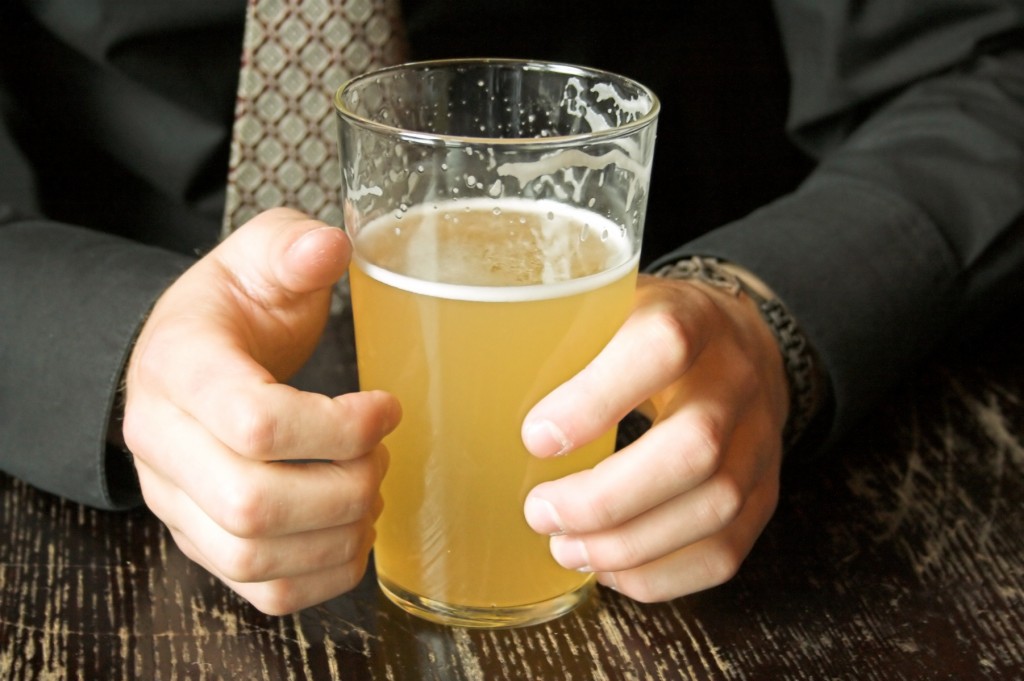Alcoholism doesn't discriminate, but in Romania society does
 In a small somewhat bare cantina style bar in downtown Bucharest several men are standing around sipping bottles of beer. Nothing unusual in that, except it's midweek and only just after nine in the morning. They may have jobs, they might have worked a night shift, they could lead reasonably successful lives, but it's a bad sign – the morning drink is one of the warning signs of a huge and to a large extent overlooked health problem in Romania and the rest of the EU – alcoholism.
In a small somewhat bare cantina style bar in downtown Bucharest several men are standing around sipping bottles of beer. Nothing unusual in that, except it's midweek and only just after nine in the morning. They may have jobs, they might have worked a night shift, they could lead reasonably successful lives, but it's a bad sign – the morning drink is one of the warning signs of a huge and to a large extent overlooked health problem in Romania and the rest of the EU – alcoholism.
By Liam Lever
In any given year 23 million people are dependent on alcohol across the continent. This is more than the population of Romania. And there are plenty more telling figures. The dependency rate is 5 percent of men and 1 percent of women in the EU, where alcohol is also a factor in 7.4 percent of all ill health and early death, EU figures suggest. In Romania, around 2 million people drink to excess, according to ALIAT, a Bucharest based addiction support service. Adding to this the inevitable impact on families and friends of alcoholics means millions of damaged lives in Romania, with only limited resources dedicated to the problem.
Many people can drink heavily seemingly without adverse affects on their lives. In a way, it's not a problem until it's a problem.
The responsible drinking campaign is all well and good, as far as it goes, but alcoholism is often overlooked in society and discriminated against. It puts sufferers on the fast track to prejudice. It's a problem that crosses every border in the EU, and leaves its victims stigmatized and disadvantaged in every aspect of their personal and professional lives.
Doctors view alcoholism as a chronic medical condition, but sadly for the millions living with it, society at large does not and healthcare provision is at best sporadic.
In Romania there are few options for alcoholics- locals and foreigners alike. In the capital city Bucharest many, at some point, might find themselves in Hospital Number 9, Bucharest's big psychiatric facility. Grand buildings and all the clichés of Romania's underfunded healthcare on the inside – shabby run down wards and tired staff who aren't big on compassion. “It's basically a drunk tank,” says Rupert Wolfe Murray, a writer and a representative of British rehab centre Castle Craig in Romania. Alcoholics are locked up and detoxed, then kicked back out onto the street.
Medical supervision of withdrawal is in many cases necessary. It can be life threatening if the patient suffers seizures. Even in less serious cases, the alcoholic may be unable to detox without help and medically supervised detox is a vital first step. Alcoholics can recognize their problem, want to stop, but are unlikely to achieve it alone. But the detox is only the first step, and that's where it stops at Bucharest's Hospital Number 9.
Almost immediate relapse is very common in patients who have been dried out with the drunk tank method. After a particularly severe relapse, Terry(*) a British recovering alcoholic in his mid thirties currently living and working in Bucharest, was restrained, knocked out with haloperidol and woke up the next day tied to a hospital bed. “I was ignored and bound like an animal,” says Terry. Eventually he worked his restraints loose, escaped from the hospital, went straight to a supermarket and bought a few litres of wine. Terry, a teacher, had this hospitalization experience in Spain, but it could have been a similar story in Bucharest or anywhere in the EU. According to Rupert Wolfe Murray, Europe's hospitals are simply not equipped to deal with alcoholism, which is by nature a chronic condition with acute episodes.
Bucharest's drunk tank treatment contrasts sharply with what dedicated rehab centres do. Typically, addicts will stay between a month and six weeks in a rehab facility. The first step is medically supervised detox, but it is only one of a range of procedures. Patients undergo a lot of individual and group therapy focusing on addiction, but other psychological conditions, often the underlying cause of dependence, are also dealt with. Those fighting addiction problems, who cannot find ways to recover locally, can opt for private clinics such as Castle Craig. This level of support is difficult to find in Romania, and at a cost of GBP 20,000 for treatment, few Romanians can afford to go abroad for specialized rehabilitation.
“When a condition such as depression, anxiety, an eating disorder or post traumatic stress disorder co-exists with an addiction these conditions – although distinct – will interact with one another, and can certainly contribute to the potential for relapse if left untreated,” says Dr Florian Kaplick, consultant psychiatrist at the Castle Craig rehab centre.
Romania, like nearly everywhere in the world, has Alcoholic Anonymous groups, including some English speaking meetings. The organization, which avoids press communication and has strict rules on anonymity to protect its members, has been vital for millions of recovering alcoholics in turning their lives around. Many rehab centres introduce patients to the AA's 12 step program. When talking to members, it's common to hear them say that AA has literally saved their lives.
There are several striking features of AA meetings. Many of the people are smart, confident and clearly very successful. It's common to see the top lawyer, the construction worker, the housewife, the policeman, the hard nosed business woman or the politician, all sat in a circle, sharing their experiences and giving one another mutual support. Their background stories differ, as they come from all walks of life, but although the scenery is different, their stories bear great similarities. The pain, the loss, the desperation, the lives of the alcoholics and those around them ruined. Alcoholism doesn't discriminate, but society does.
Yet in spite of the depths to which the condition can drag its victims, there is hope. Some maintain abstinence for decades and live long fulfilled lives; millions of AA members provide living proof that recovery is possible. For many it is the only available option in a society they feel ignores, stigmatizes and misunderstands the condition.
One of the few other options in Bucharest is the ALIAT centre. It's small, reliant on EU funds and has no facilities for residential care. However, it does offer the long term therapy that appears to be necessary for the successful treatment of alcoholism.
Dependence on alcohol, the need to drink, brings many withdrawal symptoms when alcohol intake is stopped, such as tremors, sweating, nausea, hallucinations and seizures, which can cause permanent brain damage or be fatal in the most extreme cases. Depression, anxiety, restlessness, irritability and insomnia are commonplace psychological withdrawal effects. Many symptoms are viewed from the outside simply as a result of a stressful daily life. Add to this the tendency for alcoholics, like other addicts, to hide their problems and it's no surprise that in many cases the condition remains hidden for long periods of time.
Terry grew up in England, where at the time there was widespread use of recreational drugs among young people. “I've met plenty of alcoholics who have never taken any drugs at all, but the time and place where I grew up, with the whole house music ecstasy scene, there was a lot of drugs about.” He lists the drugs him and friends used to take, “We did a lot of ecstasy and amphetamines, coke when we could afford it, smoked hashish, ate magic mushrooms by the hundred and dropped a lot of acid. I suppose I started drinking quite a lot to get over the after effects of the drugs.”
Later Terry straightened out, gained professional qualifications and went into full time work as a teacher. But he carried on drinking. “Regular drinking seemed perfectly acceptable, compared to what I'd done before. I felt as though I'd reformed, I was responsible, working hard, doing what I thought was the right thing.”
Terry was drinking more and more and eventually he went from being a functioning hard drinker to an alcoholic in the space of 24 hours. He had been drinking heavily on a daily basis for a number of years, but he was still able to get up in the morning and do a days work. “For me there was definitely a crossing the Rubicon moment,” says Terry.
“One day, after a particularly excessive boozing session, I woke up and felt completely different. It wasn't like a hangover, it was something else entirely. I remember acute anxiety, verging on panic attacks, and a desperate desire for alcohol, even though it was mid morning and I'd only just woken up,” he remembers. He started drinking straight away and found that after a few strong Belgian beers, he felt much better. “It was my first day as a full blown alcoholic. I'd gone from being a functioning heavy drinker to an alcoholic in the space of 24 hours.”
He recounts how in his professional life, a reputation for being a heavy drinker, or somebody who 'worked hard and played hard,' was not particularly a problem. It is a rather common view in Romanian society too. In fact, some of the local traditions push people beyond their limits: the 40 traditional glasses of wine on March 9 are an example of what many believe a 'real' man in Romania should be able to do.
Despite the warning signs, it was only when Terry lost the ability to function that the alcoholism was recognised. Terry's story isn't unique, in Bucharest or elsewhere.
In 2012, in Romania, and everywhere else, the alcoholic faces a long and difficult battle. In Romania, there aren't many choices for foreigners who find themselves in this situation. They can find themselves isolated, away from family and friends, making the challenges they face even greater. Recovering from alcoholism can be tougher for expatriate workers in general across the EU. Opportunities for European citizens to work in other EU countries are opening, but a lack of support can be an extra hurdle for recovering alcoholics to overcome when pursuing professions around the Union, ultimately denying them some of the rights and opportunities at the heart of the European ideal.
Prejudice is an important obstacle to the recovering alcoholic. Terry and many like him would never admit to alcoholism in an interview or on an application form, and he would be unlikely to ask an employer for help and support. In many cases, work is actually absolutely crucial for recovery. But many alcoholics lose their jobs and end up virtually unemployable. The stigmatization in the professional world makes addiction a unique health condition.
While firing somebody for having any other chronic health condition is unthinkable, alcoholism is generally considered an acceptable reason to sack people. Rupert Wolfe Murray describes the normal policy in the workplace as “cover up or fire.” Heavy drinking is tolerated as long as the employee can still function. As soon as the line is crossed and the alcoholic can no longer work effectively, he or she is fired, he says.
The response from the press officer of a leading international consultancy company operating in Romania when asked about the firm's policies on alcoholism, was “I can't help with info on this, neither can my colleagues in the HR consultancy practice,” suggesting a complete lack of policy for dealing with employee alcoholism.
The EU does provide some funding, but the policy on alcohol seems somewhat vague and non-committal. The key areas for action include protecting unborn children, reducing alcohol related road accidents, preventing impact on the workplace and encouraging 'appropriate' drinking habits, without mention of alcoholism in the areas for action. The condition is only mentioned once in the policy and buried way down near the end.
“I think educating about alcohol and encouraging responsible drinking is a good idea,” says Terry, “but it doesn't go far enough. It should be recognised that as long as there is alcohol, there will be alcoholism, that it's a chronic medical condition and that if societies are going to condone drinking, they should provide care and treatment for those who become dependent.”
Medical insurance almost never covers addiction treatment. Rupert Wolfe Murray believes the lack of service or even interest among Romanian health professionals is at least partially motivated by money. Treating addiction is expensive and time consuming. There is no quick fix, no wonder drug. Despite alcoholism having been around for as long as alcohol, there have been few developments in treatment. While depression treatment has been revolutionized by Selective Serotonin Re-uptake Inhibitors (SSRIs) such as prozac, there have been no equivalent breakthroughs in addiction treatment. There is no guarantee of success, there is no 'cure', and even with access to the very best care, some alcoholics will not recover and the condition will eventually kill them. Plenty of examples of success and failure can be found in celebrity culture.
But the lack of a guaranteed cure does not stop societies from taking care of the sick. Other medical conditions with an even poorer prognosis are treated and sufferers of terminal diseases receive palliative care across the EU. Why treat alcohol treatment differently?
Beyond AA, Hospital Number 9 and centers such as ALIAT, Romania has little to offer. But unlike with many other EU issues, where Romania compares poorly with the rest of the union, when it comes to the understanding and treatment of alcoholism, the country isn't really much worse than everywhere else.
Treating alcoholics might be difficult and expensive. But in a way, not tackling the problem is a false economy. Estimates for the annual cost to the EU from alcohol run at well above EUR 100 billion. The lack of company policy on alcohol addiction issues and the increasing sales of alcoholic beverage producers add to the issue.
The situation is somewhat better in the US than in Europe. The US Occupational Safety and Health Administration encourages and supports businesses in setting up internal policies on addiction. Many US companies give alcoholics and drug addicts the option to keep their jobs if they undergo treatment. “I've lost jobs through drinking,” says Terry. He is not asking an employer to accept drunkenness, or continued absences due to drinking, but for him, the ideal would be if employers understood alcoholism as a medical condition and recognized that it can be treated and managed.
Some recovering alcoholics manage to stop and never take another drink. Others achieve lasting abstinence after a period of occasional relapses. These relapses can be incredibly destructive if not properly managed. Terry has had plenty of experience of them during his near ten year battle with addiction. He got to the point where he dreaded relapses, feeling deeply guilty and ashamed every time he fell off the wagon. “The zero to sixty speed is astonishing, I've gone from being perfectly ok, working, sober, to a trembling mess suffering multiple panic attacks in the space of 72 hours,” says Terry.
At the moment, Terry is hopeful for the future, but he hasn't always felt like that. He found it very hard to live without hope and there have been times when he thought there was no solution, no chance of life ever being good again. “I think we all need to believe that something good could happen tomorrow, or next week, or whenever, that we're going to achieve some of our ambitions, that we might be happy or in love, if not right now, at least sometime in the future. There were times when alcohol took all that away from me.”
By Liam Lever, liam@romania-insider.com
(*- the name has been changed for confidentiality reasons)
Doctors use questionnaires to assess drinking habits. Typically they are a series of questions on the frequency and quantity a person drinks, along with the impact drinking has on the personal and professional life of the subject.
Some typical questions might be Do you drink everyday? Do you ever have a drink to get over the after effects of drinking heavily? (the so called hair of the dog) Have you missed days at work due to drinking? Have you lost a job through drinking? Has drink played a role in ending a relationship? Do you ever need a drink in the morning? Answering 'yes' to any of these questions is a warning sign that drink might be or become a problem.
(photo source: Photoxpress.com)











